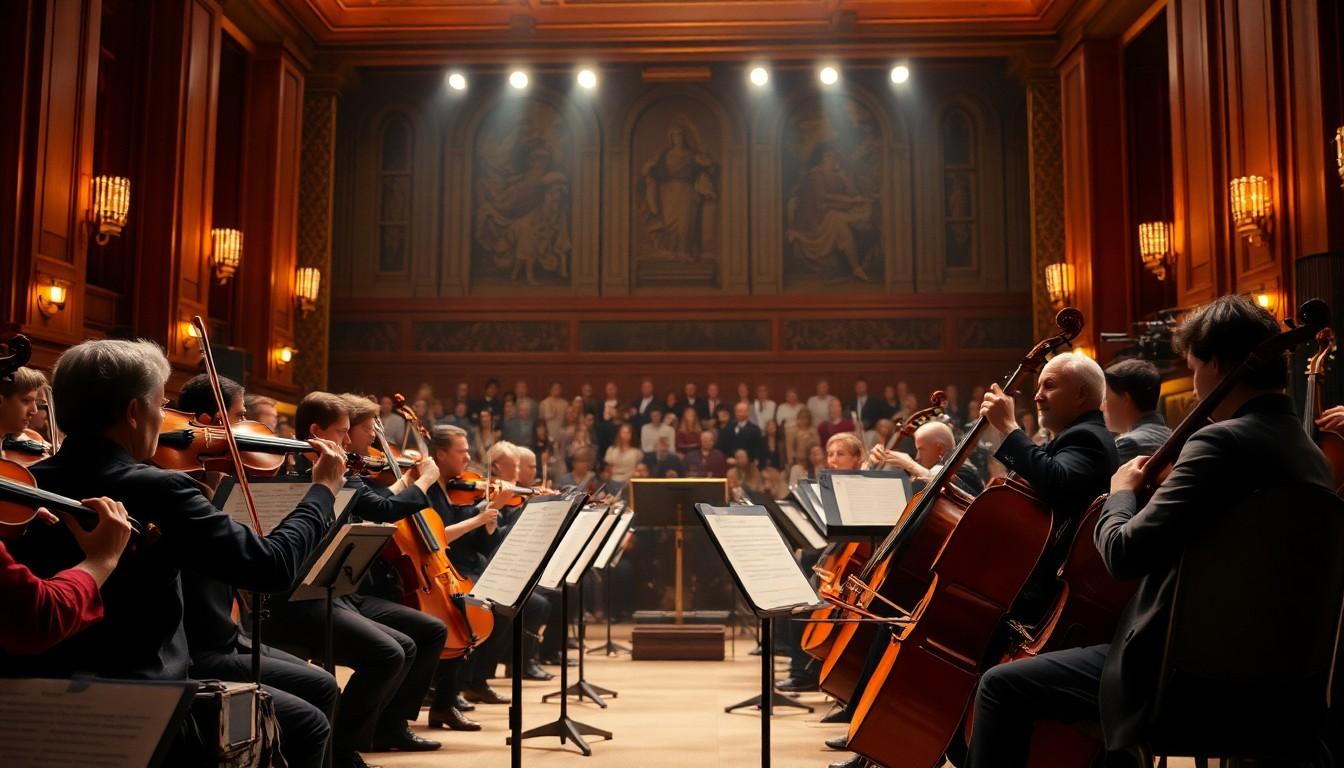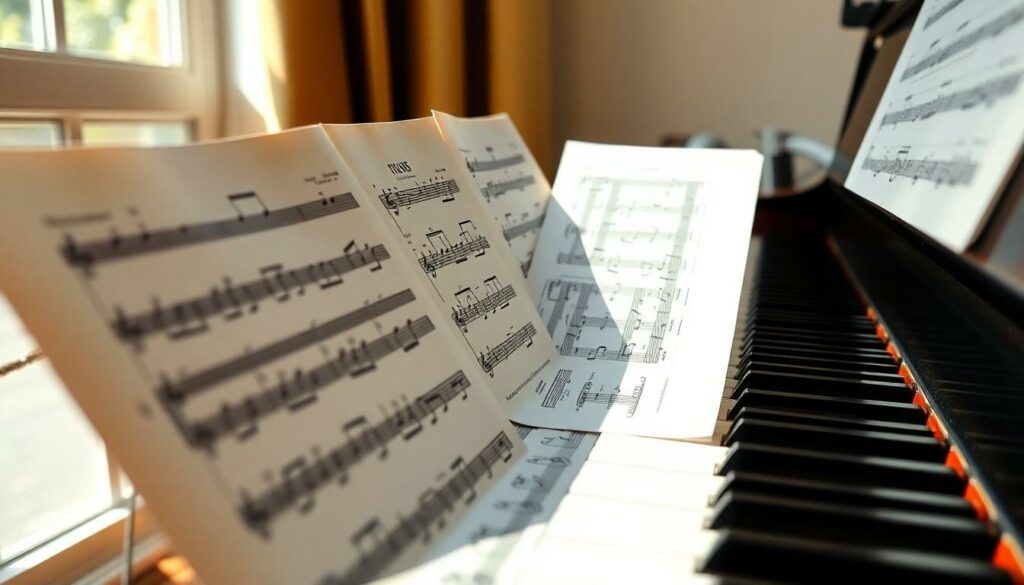Classical music in movies isn’t just for snooty film critics or fancy dinner parties. It’s the secret sauce that transforms a simple scene into a masterpiece. Ever noticed how a dramatic symphony can make a car chase feel like a ballet? That’s no accident. Filmmakers have long relied on the emotional power of classical compositions to elevate their storytelling, and it’s time to give this unsung hero its due credit.
Table of Contents
ToggleOverview of Classical Music in Movies
Classical music plays a pivotal role in filmmaking. It enhances narrative depth and emotional resonance across various genres. Filmmakers utilize classical compositions to elevate scenes, transforming ordinary moments into extraordinary experiences.
Numerous iconic films feature classical pieces as integral components. Movies like “A Clockwork Orange” and “The King’s Speech” prominently showcase classical music to underscore themes and moods. Emotional scenes often benefit from the timeless quality of these compositions, making them memorable.
Soundtracks often incorporate works from composers such as Mozart, Beethoven, and Tchaikovsky. These composers’ music resonates with audiences, creating connections that transcend language and culture. By using well-known pieces, directors can evoke a predetermined emotional response, enriching viewer experience.
Classical music serves more than just aesthetic indulgence. It amplifies tension during climactic moments while offering a counterpoint in lighter scenes. In action-packed sequences, classical scores can add layers of sophistication, illustrating the artistry behind the filmmaking process.
Audiences recognize classical compositions, which can heighten engagement. Listeners might find themselves more invested in the narrative when familiar pieces play. These musical choices demonstrate the versatility of classical music, appealing to a broad audience and contributing significantly to the overall impact of cinema.
Classical music is a critical element in films. Its ability to evoke emotions and enhance storytelling stands as a testament to its enduring legacy in cinema. Recognizing this influence allows for a more profound appreciation of both music and film.
Importance of Classical Music in Film Scores

Classical music plays an integral role in shaping the overall cinematic experience. Filmmakers utilize its power to enhance storytelling and deepen emotional connections.
Enhancing Emotional Impact
Emotional resonance defines many cinematic moments. Classical compositions heighten intensity during climactic scenes. Their melodic structures evoke feelings, fostering audience engagement. For instance, in “The King’s Speech,” Beethoven’s themes underscore personal struggles and triumphs. Iconic melodies have the ability to evoke nostalgia, making viewers more connected to characters. Classical music can transform dialogue-heavy scenes into profound emotional experiences. Through subtle orchestral swells, filmmakers guide audiences through complex emotions, ensuring scenes leave lasting impressions.
Setting the Atmosphere
Atmospheric elements deeply influence audience perception. Classical music sets the tone, establishing moods that align with the film’s themes. Suspenseful moments benefit from urgent compositions, while serene scenes may utilize gentle sonatas. In “A Clockwork Orange,” the use of Beethoven heightens the film’s dark themes, creating a unique juxtaposition. Cinematic settings gain depth and nuance through carefully selected classical pieces. The emotional weight of each scene increases as soundtracks weaves into the narrative, allowing viewers to feel fully immersed in the story.
Notable Examples of Classical Music in Movies
Classical music resonates throughout film history, enriching narratives and enhancing viewer experiences. Iconic scores and compositions remain memorable elements in numerous films.
Iconic Classical Pieces in Film
Beethoven’s “Symphony No. 7” elevates scenes in “The King’s Speech,” grounding King George VI’s personal struggles in triumphant tones. Tchaikovsky’s “Swan Lake” effectively underscores the haunting undertones of “Black Swan,” enhancing the psychological tension. “Clair de Lune,” a piece by Debussy, beautifully accompanies moments in “Ocean’s Eleven,” creating a mood of elegance and calm. These pieces exemplify how classical compositions can enhance storytelling and emotional depth, leaving lasting impressions.
Modern Films Utilizing Classical Music
Modern films continue to embrace classical compositions. In “The Breakfast Club,” the use of Schubert’s “Ave Maria” evokes deep emotional resonance, making a pivotal scene more poignant. “The King’s Speech,” known for its powerful score, features a blend of classical pieces that capture both struggle and triumph. Films like “A Beautiful Mind” use moments of Mozart’s genius to highlight significant character developments. These choices showcase how classical music remains a vital component in contemporary cinema, effectively communicating complex emotions.
The Evolution of Classical Music in Cinema
Classical music’s presence in cinema dates back to the early 20th century, where it began enhancing silent film experiences. The integration of scores composed of classical pieces transformed how stories were told, deepening emotional resonance. Silent films often relied on live orchestras to create atmosphere, setting the stage for future developments.
As sound technology evolved, the incorporation of classical music became standard in mainstream cinema. Iconic composers, such as Bernard Herrmann and John Williams, merged classical elements with contemporary sounds, creating memorable soundtracks. Films like “Psycho” showcased this blend, where Herrmann’s strings amplified tension and suspense.
Modern cinema continues to reflect classical music’s influence. Contemporary filmmakers frequently draw from historical compositions to evoke nostalgia or reinforce themes. Exploiting works from composers like Mahler and Chopin, films delve into complex emotional landscapes.
Notable scores infuse films with depth and complexity. In “A Clockwork Orange,” Beethoven’s Ninth Symphony highlights the juxtaposition of violence and beauty. Equally, Tchaikovsky’s “Swan Lake” in “Black Swan” mirrors the protagonist’s struggle with duality.
Academic studies underline classical music’s role in shaping audience reactions. Research indicates that familiar melodies create a sense of comfort and anticipation, intensifying engagement. Specific compositions resonate across cultures, providing emotional bridges among diverse viewers.
The evolution of classical music in cinema proves its lasting significance. By employing timeless scores, filmmakers enhance storytelling and deepen viewer connections. Such tradition remains vital, enriching the cinematic experience for audiences worldwide.
Classical music remains an indispensable element in the world of cinema. Its ability to evoke emotions and enhance storytelling is unmatched. From the tension of a thrilling chase to the serenity of a heartfelt moment, classical compositions elevate the viewer’s experience.
As filmmakers continue to explore the depths of this timeless art form, audiences can expect to see classical music playing a vital role in shaping narratives for years to come. The integration of these iconic scores not only enriches the film but also creates lasting connections with viewers, proving that classical music’s legacy in cinema is far from over.



